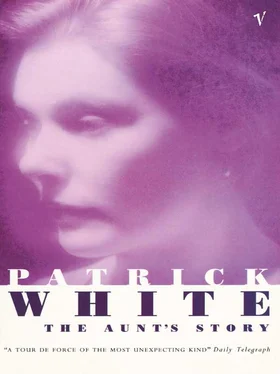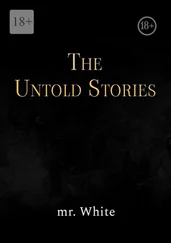This made everyone run out of the house, everyone from the back of the house — that is, Gertie Stepper, and Pearl Brawne, and Tom Wilcocks, and Fanny, and any old man who was being given tea. Everyone ran out. It made quite a scattering of fowls.
Gertie said the Syrian sold trash, but everybody liked to buy, and Gertie even, to touch and choose. It was exciting as the cart grated through the yard. Turkeys gobbled. Dogs barked. The day was changed, which once had been flat as a pastry board. Now it was full of talk, and laughing, and the whining of the Syrian’s mangy dog, and the jingled harness of his old blue horse. Now there was no question of work, now that the Syrian had come.
The Syrian himself was dry and brown, with blue tattoo marks on his hands. The eyes were deep and dark in the bones of his face. But they did not tell much, nor did his voice, in the language that he talked. When the Syrian became intelligible, he spoke in shillings, or with his brown hands. He uncovered his brown teeth in a clockwork smile. Out of the cart, from under the old tarpaulin, he brought the openwork stockings, the ribbons, the shawls, the mouth-organs, the safety-pins, and the pen-knives that he sold.
Once there was a silver shawl. Horiental, said Gertie Stepper. He tossed it out for everyone to see. How it blew in the winter wind! It streamed like a fall of silver water from the Syrian’s hand.
‘Oooooh!’ everybody cried.
And, ‘Oo- er ,’ said Pearl Brawne.
But Gertie Stepper, she got red, all except her pinched-up mushroom nose, and she hit at the brown knuckles with an iron spoon.
‘Hey, you,’ said Gertie. ‘You no good. No good shawl. You think I no see, eh?’
And now it was a fact. The splendid shawl that everyone had pushed to see was a poor, ragged, flapping thing that fell. It lay exposed on the hard ruts. The Eastern shawl had a hole in the corner, which the Syrian had held hidden in his hand.
‘Cheap. Very cheap.’ He smiled and pointed.
‘Yairs, yairs,’ said Gertie. ‘That may be, Mr Ali Baba. You can keep that to tell in court.’
Then everybody laughed, even Gertie Stepper, almost, from behind her tin-rimmed spectacles that were mended with a piece of string.
Once when the Syrian left, Theodora went with him some of the way. In the white-lit winter evening her legs grew longer with the strides she took. Her hair flew. She had increased. She walked outside a distinct world, on which the grass quivered with a clear moisture, and the earth rang. In this state, in which rocks might at any moment open, or words convey meaning, she stood and watched the Syrian go. His silence slipped past. The hills settled into shapelessness. She was left with the trembling of her knees.
Afterwards, trailing through the shrunk yard, there was no external evidence that the Syrian had been. The meat-safe still creaked on its wire hook, and the kitchen window’s yellow square denied the immensity of shapelessness. Even Theodora Goodman’s hair hung meekly in damp tails.
‘Wherevcrvyoubeen, Theo?’ asked Gertie Stepper.
‘I walked some way with the Syrian.’
‘That dirty Syrian hawker man! Don’t you never do that again!’
‘Oo- er ,’ said Pearl Brawne, and she giggled into tea.
The kitchen was bright, white. It’s warmth nuzzled, like fur.
‘Theo, fancy,’ Fanny said. ‘And it’s dark too. I’d be afraid.’
Fanny was often afraid. She sat up in bed and screamed when the nightlight sank in the saucer. But in the mornings Fanny shone. In the mornings Fanny took her basket, after she had practised scales, which were always so smooth and pleasing to Mother. She sat and rocked on the veranda, under the hanging maidenhair. She pursed up her mouth, to amuse, and said, ‘Now I shall do my broidery.’
She stitched a man in a cocked hat, and a train with smoke in its funnel, and a border of morning glories. And in the middle of it all she stitched:
FANNY GOODMAN
1899
‘There, Theodora. Look at your sister,’ said Mother.
‘Oh, leave me alone,’ Theodora cried. ‘I am all right.’
Because she felt her own awkwardness. After she had hidden in the garden, she looked at her hands, that were never moved to do the things that Fanny did. But her hands touched, her hands became the shape of rose, she knew it in its utmost intimacy. Or she played the nocturne, as it was never meant, expressing some angular agony that she knew. She knew the extinct hills and the life they had once lived.
‘Let us play at houses,’ Fanny said. ‘I shall have a house with twenty rooms. In one room there will be ivory, and in another gold, and another amethyst. I am going to dust the ornaments with a feather duster. I have children too, but they will not be allowed in these rooms, in case they are boisterous and knock over my things. You are my husband, Theo, but you will be out most of the day, riding round the place. You have many sheep, and you will make a great deal of money, and buy me diamonds and lovely furs. In the whole district there is no one as rich as us. Listen, Theo, look! How can you play if you don’t listen?’
‘Yes? Tell me,’ Theodora said.
And she returned. She stood to learn the rules of the game that she must play.
Fanny made many rules. She thought of many clever games, which were like the swift, smooth music that she played, or the morning glories that she stitched. There they were. Mother was proud.
‘Fanny is the artistic one, Mrs Parrott,’ Mother said.
‘But Theodora,’ said Father, ‘has great understanding.’
‘Of course,’ said Mrs Parrott, who looked frightened, as if it were the first time she had been given this to eat.
‘Theodora,’ she said, ‘is a good, bright girl. She is always very polite.’
Mrs Parrott had a weak voice. To assist it she had to suck a lozenge, of which she kept a supply in a little silver box. Her bag was full of rich things, but she was a thin and sandy woman, pale, like her voice, and the pale things she said.
‘Children are funny little things,’ said Mrs Parrott.
Whenever she came to the house, Father usually left. Father said, ‘Come on, Theo. You and I shall go out and shoot.
She had a small rifle which she took on these occasions, and which was the cause of many arguments. Because Mother hated and despised Theodora’s rifle. She said it was unseemly for a girl to traipse about the country with a gun. But Father stood firm. This was something, he said, that Mother would not understand. It was wrong and unreasonable, Mother said. It was something, said Father, that he could not very well explain. Anyway, Theodora kept her rifle.
Because of the many words that it had caused, she never mentioned it. She took it down in silence from the rack on the wall outside Father’s door, and the weight of the rifle, and the smoothness of its wood, and the coldness of its dark, keen metal, together with other circumstances, added solemnity to her act. On afternoons when she went shooting she let herself out by the side door to avoid the heat of argument. The side door opened on to the pines, and for many years Theodora connected the hush of dead needles and the sound of living pines with the smooth, clean, oily smell of her little rifle.
It hung rather too heavy from her bony shoulder, as she made her legs keep pace with Father. Her joints appeared excessively loose. Theo should have been a boy, they said, the more obliging ones, hoping to make the best. But she herself had never considered what could not have been such a different state. Life was divided, rather, into the kinder moments and the cruel, which on the whole are not conditioned by sex.
Anyway, carrying the rifle, she was free. They walked through the paddocks, through the yellow tussocks, where the sloughed snakeskin chafed and chattered, through the grey, abstracted, skeleton trees, and past the big black boulders that the hills had tossed out before they cooled. Father did not speak. He respected silence, and besides, whether it was summer or winter, the landscape was more communicative than people talking. It was close, as close as your own thought, which was sometimes heavy and painful as stone, sometimes ran lighter than a wagtail, or spurted like a peewit into the air.
Читать дальше












